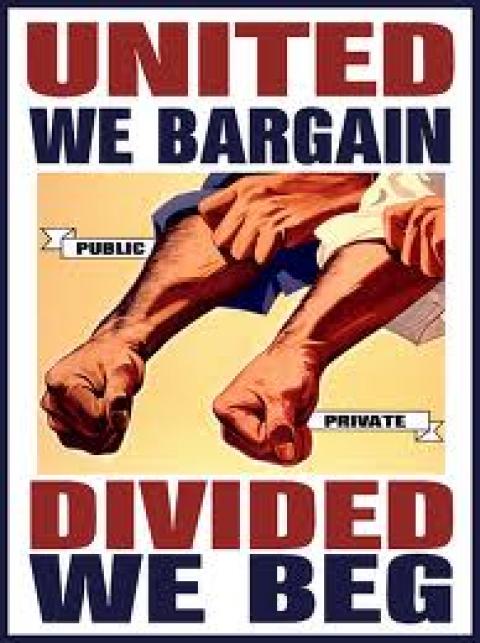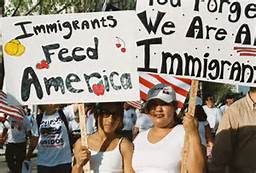| Working for a Livable Minimum Wage |
|
 A livable minimum wage means full-time workers can afford to provide basic necessities for their families: food, shelter, health care, education. Workers fought hard for 8 hour days and 5 day work weeks but underpaying employees undermines these protections as many low-wage workers need two or three jobs to make ends meet. As worker productivity has increased, labors' share of the gains has decreased, wages have stagnated while profits and dividends have increased exponentially. A livable minimum wage ensures that workers receive fairer compensation for their labor.
A livable minimum wage means full-time workers can afford to provide basic necessities for their families: food, shelter, health care, education. Workers fought hard for 8 hour days and 5 day work weeks but underpaying employees undermines these protections as many low-wage workers need two or three jobs to make ends meet. As worker productivity has increased, labors' share of the gains has decreased, wages have stagnated while profits and dividends have increased exponentially. A livable minimum wage ensures that workers receive fairer compensation for their labor.
|
| Workplace Violence |
|
 Workplace assault and violence is a hidden workplace hazard unless a major tragedy hits the media. Every day workers face verbal and physical assault and sometimes suffer in silence because many incidents are not reported and recorded. Many workers do not step forward because supervisors will not act to protect them or will retaliate against them for reporting a problem.
Workplace assault and violence is a hidden workplace hazard unless a major tragedy hits the media. Every day workers face verbal and physical assault and sometimes suffer in silence because many incidents are not reported and recorded. Many workers do not step forward because supervisors will not act to protect them or will retaliate against them for reporting a problem.
|
| It's Your Job - These Are Your Rights |
|
 Do I have responsibilities to my employer?
What is the minimum wage?
Must I be paid for all the hours I work?
When do I get overtime pay?
Can I work "off the clock" or "off the books?"
What happens if I'm sick?
What if I get hurt on the job?
What if my job isn't safe?
Am I protected from discrimination and harassment?
Can I lose my job for any reason?
What if I am laid-off?
Am I protected in other ways?
Do I have responsibilities to my employer?
What is the minimum wage?
Must I be paid for all the hours I work?
When do I get overtime pay?
Can I work "off the clock" or "off the books?"
What happens if I'm sick?
What if I get hurt on the job?
What if my job isn't safe?
Am I protected from discrimination and harassment?
Can I lose my job for any reason?
What if I am laid-off?
Am I protected in other ways?
|
| Youth Workers |
|
 There are special protections in place for workers under the age of 18 because they have traditionally been at higher risk of exploitation by unscrupulous employers. NH COSH conducts targeted training to teach young people about worker protections to help them learn about their rights in the workplace.
There are special protections in place for workers under the age of 18 because they have traditionally been at higher risk of exploitation by unscrupulous employers. NH COSH conducts targeted training to teach young people about worker protections to help them learn about their rights in the workplace.
|
| Unions |
|
 Collective bargaining for workplace safety is important because: The union can negotiate contract language that is stronger than OSHA regulations. Contracts can enable the union to grieve health and safety issues, instead of relying on government enforcement.
Collective bargaining for workplace safety is important because: The union can negotiate contract language that is stronger than OSHA regulations. Contracts can enable the union to grieve health and safety issues, instead of relying on government enforcement.
|
| Immigrants |
|
 Immigrants and refugees are an important part of New Hampshire's workforce and communities. Most federal and state laws providing worker protections apply to all workers - not just citizens. It is important for all workers that no one is excluded from health and safety laws regulating a safe workplace. NH COSH conducts free trainings on workers rights, job safety, and workers compensation for immigrants and refugees.
Immigrants and refugees are an important part of New Hampshire's workforce and communities. Most federal and state laws providing worker protections apply to all workers - not just citizens. It is important for all workers that no one is excluded from health and safety laws regulating a safe workplace. NH COSH conducts free trainings on workers rights, job safety, and workers compensation for immigrants and refugees.
|
| Workers' Compensation |
|
 America's workers compensation system was created more than a hundred years ago. The basic principle is that employers assume responsibility for providing insurance that pays out certain benefits, without regard to fault, to workers injured on the job. In return, employers are protected from personal injury or other liability for workplace injuries and illnesses. Workers’ compensation benefits include medical care, rehabilitation, and reimbursement for lost wages for work-related injuries.
America's workers compensation system was created more than a hundred years ago. The basic principle is that employers assume responsibility for providing insurance that pays out certain benefits, without regard to fault, to workers injured on the job. In return, employers are protected from personal injury or other liability for workplace injuries and illnesses. Workers’ compensation benefits include medical care, rehabilitation, and reimbursement for lost wages for work-related injuries.
|
Page Last Updated: Jul 13, 2016 (07:59:00)
|


